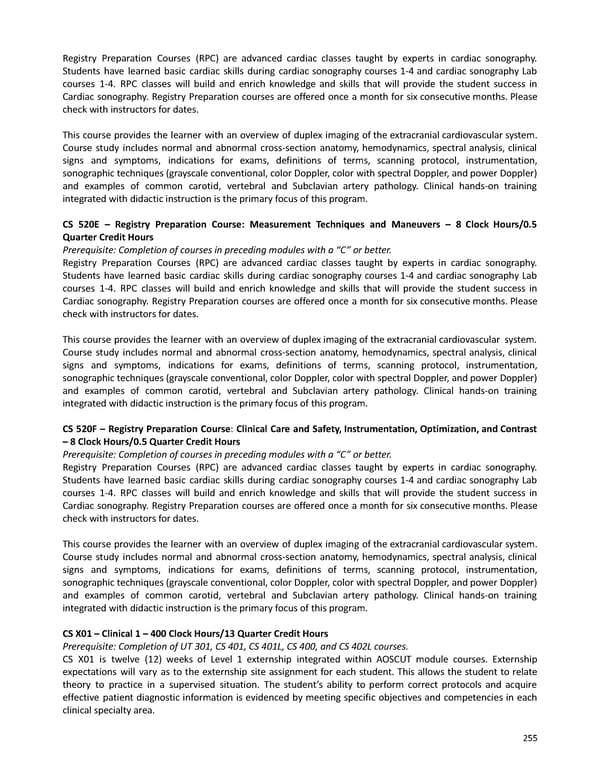Registry Preparation Courses (RPC) are advanced cardiac classes taught by experts in cardiac sonography. Students have learned basic cardiac skills during cardiac sonography courses 1-4 and cardiac sonography Lab courses 1-4. RPC classes will build and enrich knowledge and skills that will provide the student success in Cardiac sonography. Registry Preparation courses are offered once a month for six consecutive months. Please checkwithinstructors for dates. This course provides the learner with an overview of duplex imaging of the extracranial cardiovascular system. Course study includes normal and abnormal cross-section anatomy, hemodynamics, spectral analysis, clinical signs and symptoms, indications for exams, definitions of terms, scanning protocol, instrumentation, sonographic techniques (grayscale conventional, color Doppler, color with spectral Doppler, and power Doppler) and examples of common carotid, vertebral and Subclavian artery pathology. Clinical hands-on training integrated with didactic instruction is the primary focus of this program. CS 520E – Registry Preparation Course: Measurement Techniques and Maneuvers – 8 Clock Hours/0.5 QuarterCreditHours Prerequisite: Completion of courses in preceding modules with a “C” or better. Registry Preparation Courses (RPC) are advanced cardiac classes taught by experts in cardiac sonography. Students have learned basic cardiac skills during cardiac sonography courses 1-4 and cardiac sonography Lab courses 1-4. RPC classes will build and enrich knowledge and skills that will provide the student success in Cardiac sonography. Registry Preparation courses are offered once a month for six consecutive months. Please checkwithinstructors for dates. This course provides the learner with an overview of duplex imaging of the extracranial cardiovascular system. Course study includes normal and abnormal cross-section anatomy, hemodynamics, spectral analysis, clinical signs and symptoms, indications for exams, definitions of terms, scanning protocol, instrumentation, sonographic techniques (grayscale conventional, color Doppler, color with spectral Doppler, and power Doppler) and examples of common carotid, vertebral and Subclavian artery pathology. Clinical hands-on training integrated with didactic instruction is the primary focus of this program. CS 520F – Registry Preparation Course: Clinical Care and Safety, Instrumentation, Optimization, and Contrast –8ClockHours/0.5QuarterCreditHours Prerequisite: Completion of courses in preceding modules with a “C” or better. Registry Preparation Courses (RPC) are advanced cardiac classes taught by experts in cardiac sonography. Students have learned basic cardiac skills during cardiac sonography courses 1-4 and cardiac sonography Lab courses 1-4. RPC classes will build and enrich knowledge and skills that will provide the student success in Cardiac sonography. Registry Preparation courses are offered once a month for six consecutive months. Please checkwithinstructors for dates. This course provides the learner with an overview of duplex imaging of the extracranial cardiovascular system. Course study includes normal and abnormal cross-section anatomy, hemodynamics, spectral analysis, clinical signs and symptoms, indications for exams, definitions of terms, scanning protocol, instrumentation, sonographic techniques (grayscale conventional, color Doppler, color with spectral Doppler, and power Doppler) and examples of common carotid, vertebral and Subclavian artery pathology. Clinical hands-on training integrated with didactic instruction is the primary focus of this program. CSX01–Clinical1–400ClockHours/13QuarterCreditHours Prerequisite: Completion of UT 301, CS 401, CS 401L, CS 400, and CS 402L courses. CS X01 is twelve (12) weeks of Level 1 externship integrated within AOSCUT module courses. Externship expectations will vary as to the externship site assignment for each student. This allows the student to relate theory to practice in a supervised situation. The student’s ability to perform correct protocols and acquire effective patient diagnostic information is evidenced by meeting specific objectives and competencies in each clinical specialty area. 255
 2023-2024 | Catalog Page 254 Page 256
2023-2024 | Catalog Page 254 Page 256